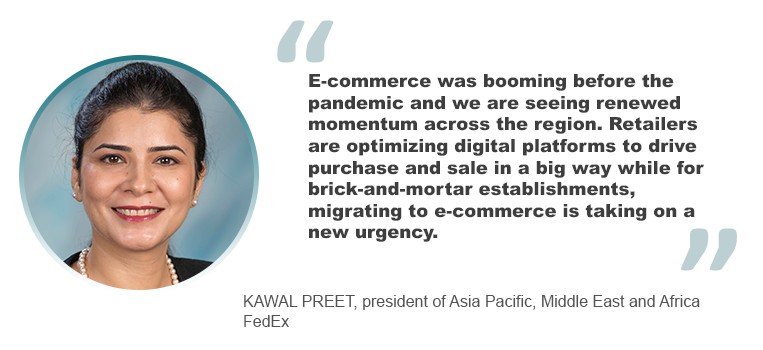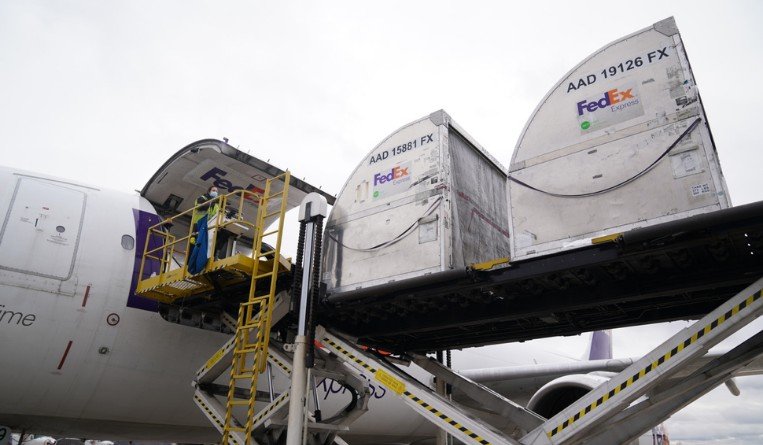FedEx is anticipating a change in the pattern of how goods move across the world in the wake of the coronavirus pandemic with a particular focus on reducing dependencies in supply chains.
Kawal Preet, president of Asia Pacific, Middle East and Africa (AMEA) at the company, said the ongoing coronavirus crisis has revealed “strategic vulnerabilities” in business across various industries – and for the logistics sector, in particular, this has led to the emergence of three long-term drivers which could be expected post-Covid-19.
“The COVID-19 pandemic has helped accelerate change in new ways of working, tech adoption and opportunities for diversification. Generally speaking, we see three long-term drivers behind the creation of the ‘new normal’: production shifts, a renewed focus on deferred, and increased e-commerce adoption in AMEA,” Preet told Asia Cargo News.
She said sourcing links within the supply chain will also become more diversified with more countries in Asia set to benefit like India, Malaysia, Taiwan, Vietnam and Thailand.
Diversification of supply chains
“The new normal will see diverse sourcing under decentralized supply chains. This will change the pattern of how goods move and will create a need for trade lane diversification to reduce dependencies on one country or one production location,” Preet, who took over her position in March last year, said.
The FedEx executive also noted that there has been a strategic shift in supply chain management from “just in time” delivery to “just in case” inventory building – which favours increased use of slower, more economic delivery solutions – and could boost express or deferred shipping services.
In the long term, Preet told Asia Cargo News that multilateral agreements would also be beneficial in ensuring the seamless movement of goods across borders.
“This new normal is creating more awareness and understanding about the need and benefits of open trade and that different border regulations and customs procedures can lead to unexpected delays, backlogs, and other issues for shippers,” she said.
“In the long term, bilateral and multilateral trade agreements such as Regional Comprehensive Economic Partnership (RCEP) can boost international cooperation on risk management and help facilitate the movement of goods.”
Aside from supply chain diversification, e-commerce will also help boost the logistics industry as it moves to recover from the impact of the coronavirus.
Online purchases have started gaining momentum prior to the emergence of Covid-19, but the implementation of various lockdowns measures and stay-at-home orders prompted the acceleration of these purchasing behaviour.
“E-commerce was booming before the pandemic and we are seeing renewed momentum across the region,” Preet said. “Retailers are optimizing digital platforms to drive purchase and sale in a big way while for brick-and-mortar establishments, migrating to e-commerce is taking on a new urgency.”
More investments in IT, cold chain
Meanwhile, FedEx is all-hands on deck for the vaccine distribution in the AMEA region – upping its investment in the cold chain, IT infrastructure, and other requirements for healthcare logistics, while it expands its capacity to be able to meet the anticipated surge in demand.
Preet cited FedEx AMEA’s experience in healthcare logistics – including its “technology-integrated solutions for planning, storage, transportation and customs clearance of healthcare shipments,” which has proven to be valuable in the fight against the pandemic.
The company has also launched a sensor-based logistics device called SenseAware that enables highly precise tracking of shipments including location, precise temperature, relative humidity, barometric pressure readings, light exposure, shock events which, the FedEx executive noted, will be especially valuable in the distribution of environment- and time-sensitive vaccines.
“Our global network stands ready to ship Covid-19 vaccines around the world, in the Asia Pacific region, we have been boosting our cold chain capabilities in priority locations, strengthening and leaning on existing cold chain centres,” Preet said, adding that the company has boosted its cold chain by adding six ultra-low temperature freezers at its major APAC hubs.

“Innovation has been an integral part in our preparation. All in all, we’ve got a great track record in this sector and we’re employing all of the latest technology to make sure the vaccines get to where they are needed as quickly and as securely as possible,” she added.
Throughout the pandemic, Preet noted how the logistics industry has been an essential service provider, keeping aid and packages moving. FedEx alone has shipped more than 55 kilotons of PPE globally, including over 2 billion masks and 4.5 million Tyvek protective suits.
Enough cargo capacity for the region
Preet went on to assure that there is enough capacity in the market to move vaccines around the world amid earlier pronouncements from IATA that an estimated 8,000 Boeing 747 cargo aircraft would be needed to supply 10 billion vaccine doses around the globe.
“Now that seems like a lot, but there is plenty of cargo capacity in our network to handle this challenge,” she said of FedEx’s own capacity.
“We operate 8,000 flights a week and 32,000 flights a month, half of which are wide-bodied aircraft. That means we could deliver all of the world’s vaccines in just a couple of weeks because we don’t fly an airplane just once, but multiple times,” she added.
Nonetheless, Preet noted that despite the available capacity, shipping the vaccines will be a “complex process with many moving parts,” as she cited the different temperature requirements needed for the various Covid-19 vaccines and “exacting temperature requirements from start to the very end is the most obvious challenge.”
She said there is a high risk of spoilage if vaccines fall outside of the prescribed ranges for even a brief period of time with the World Health Organization (WHO), earlier estimating that up to 50% of vaccines are wasted globally each year, in large because of lack of temperature control and the logistics to support an unbroken cold chain.
“Our extensive network, technology and healthcare expertise allow us to be in a strong position to help alleviate some of this pressure,” Preet added.
To successfully supply all vaccines worldwide, Preet said the “highest level of coordination” is needed across governments, the logistics and the healthcare sector to ensure vaccines are able to reach their target markets.
Vaccine distribution in remote locations
Meanwhile, Preet told Asia Cargo News that there will be no issue for FedEx’ to deliver the vaccine in the world’s most-remote areas, citing the company’s experience and global footprint.
“Regardless of a remote location, the strength of our network allows us to pick up a package from almost any part of the world and deliver it to any other part of the world in a matter of days,” she said. “To support vaccine delivery in the Middle East and Africa, we have been boosting our cold chain capabilities, similar to what we’re doing in Asia Pacific. We have also made sure that the required IT infrastructure is in place with sensor-based tracking technologies deployed globally to provide real-time continuous tracking of the packages, including temperature.”
For Africa, she noted that FedEx has previously facilitated a series of emergency shipments to West Africa to combat Ebola.
As the industry anticipates a boost from vaccine distribution, Preet noted that it's still too early to tell the exact impact of the vaccine shipments to operations and the company’s bottom line.
“More broadly, it is expected that vaccine distribution will give the economy a proverbial shot in the arm. Businesses will have a clearer picture of when the health crisis will end, which should support CAPEX and encourage restocking,” Preet said.
“But the road to recovery will not look the same for everyone. Some small businesses in the digital and global commerce space have been doing better under the pandemic, while others need more support to ensure that their recovery continues post-Covid.”
Charlee C. Delavin



